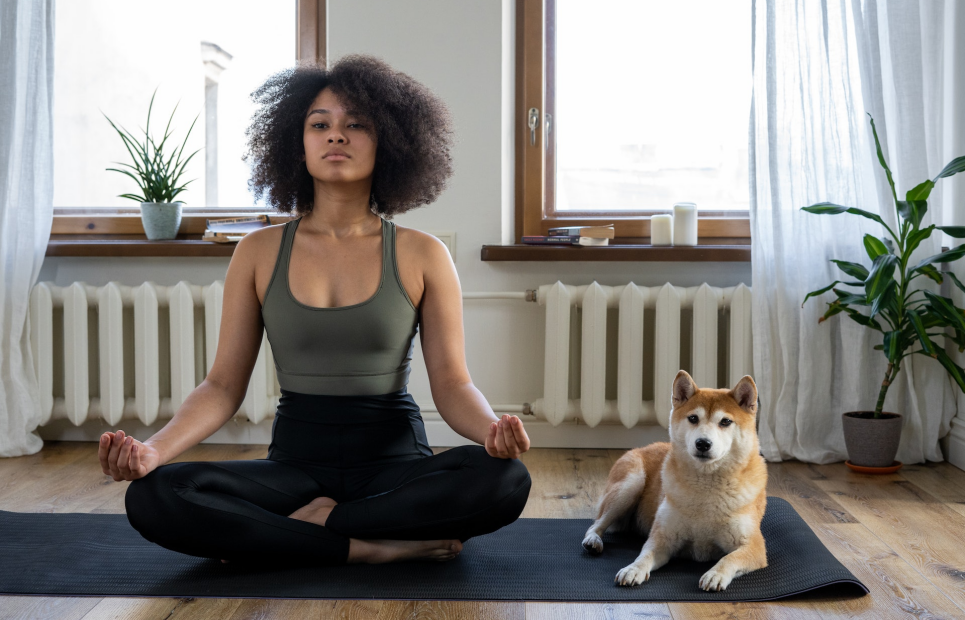HUBburger® Group Services
Log in
| admins |
| StreetTadeusza Tylewskiego 44 |
| 80-169Gdansk |
| Poland |
HUBburger® Group Services
Less stress! Master your nerves. Five ways to calm and soothe.
Health
Who among us would not like to reduce stress and the anxiety associated with it ? We have to deal with it every day. Work, family issues, health problems and financial obligations are elements of daily life that commonly contribute to increased stress levels. Fortunately, there are healthy ways to effectively mitigate it before it gets out of hand. It is worth working to regain a sense of inner peace.
Advertising

pic. cottonbro studio/ pexels.com
What is stress?
Stress is the body's response to a challenge. Everyone experiences stress, which can be triggered by a variety of events, from minor daily hassles to major changes such as divorce or job loss. The stress response includes physical elements such as elevated heart rate and blood pressure, a barrage of thoughts, and emotions including fear and anger
Most often we think of it negatively, but stress can also come from positive changes in life, such as getting a promotion at work or the birth of a new child, or getting married. Short-term stress serves an important purpose - to respond quickly to threats and avoid danger. Awakens vigilance. But long-term, chronic exposure to stress can lead to mental health difficulties, such as anxiety and depression, or increased physical health problems
No one can avoid all stressful situations, but you can work on managing your reaction to them to protect your health
How to reduce stress and regain a sense of inner peace?
1. Opt for regular exercise
Many studies show that engaging in physical activity helps lower stress levels and improve mood, while a sedentary lifestyle can lead to worsening bad mood and sleep disorders. While regular exercise does not cure, it does improve symptoms of common mental health disorders such as anxiety and depression
If you are currently inactive, don't throw yourself into the deep end, start with gentle activities such as walking or cycling. Choosing an activity that you enjoy can help increase your chances of sticking with it in the long run.Even if the physical benefits are your top priority, a nice "side effect" will be the mental benefits of regularly practicing a dispute
Consider non-competitive aerobic exercise, strengthening with weights, or exercise classes such as yoga or Tai Chi, and set reasonable goals for yourself. Aerobic exercise releases endorphins - natural substances that help you feel better and maintain a positive attitude
2. Eat and drink healthy
Chronic stress can lead to overeating and reaching for highly processed foods , rich in sugar and salt, which can harm overall health and mood
We often try to reduce stress by drinking alcohol or eating excessively. This may prove helpful, but only for a while. In fact, it compounds stress in the long run. Caffeine can also amplify the effects of stress. While eating a healthy, balanced diet can help combat it
Your diet affects every aspect of your health, including your mental health. Minimizing your intake of highly processed foods and beverages and incorporating more whole foods such as vegetables, fruits, beans, fish, nuts and seeds into your diet can help to properly nourish your body and reduce the risk of nutrient deficiencies This in turn can bepredirectly improve your resilience to situations that cause anxiety, fear and stess
3. Practice yoga and mindfulness
Although yoga styles vary, most have a common goal - to connect body and mind by increasing body and breath awareness. Yoga helps reduce stress and symptoms of anxiety and depression due to its effects on your nervous system. Can help lower cortisol (stress hormone) , blood pressure and heart rate. This is one of the most popular methods of stress relief. In addition, it can be practiced absolutely anywhere and at any age
The simplest stress reduction technique using mindfulness is meditation. Meditating consistently, even for short periods, can help improve mood and reduce symptoms of stress and anxiety. Try to calm your mind and focus on the breath even for a few minutes a day, and the results will quickly convince you to incorporate meditation into your daily routine.. Not sure how to get started? Countless books, apps and websites can teach you the basics
4. Start using CBD oil
Of all the reasons people use CBD, taking CBD for stress is one of the most popular. That's because cannabidiol, or CBD, has primarily sedative properties that can help soothe nerves. Daily use of CBD can be a way to relax and stay calm during stressful times. Some users find that it improves their mental state, giving them more mental clarity and improving concentration
Hemp oils extracted from cannabidiol (CBD) contain cannabidiol (CBD) have a mild effect and are not addictive unlike many drugs. CBD has no psychoactive effects on our body. Instead, it works on the muscular and nervous systems.The effect? A state of relaxation without the intoxicating properties of THC and a clear mind
5. Keep in touch with nature
Try to spend as much time as possible in green spaces such as parks and forests. Everywhere you are, look for green enclaves. Look at the sky, at the water's surface, try to be close to trees and flowers. Spending as little as 10 minutes in a natural setting can help improve mental well-being, as numerous studies have proven. Even if you live in the city, you can look for green spaces such as local parks, botanical gardens, or a boardwalk along the river. Go outside regardless of the season and weather
Try to do detox from smartphone, computer and tablet at least during this time. They are an unavoidable part of daily life, but spending too much time in front of screens is associated with lowered mood, poorer mental well-being and increased stress levels in both adults and children.
Stress is the body's response to a challenge. Everyone experiences stress, which can be triggered by a variety of events, from minor daily hassles to major changes such as divorce or job loss. The stress response includes physical elements such as elevated heart rate and blood pressure, a barrage of thoughts, and emotions including fear and anger
Most often we think of it negatively, but stress can also come from positive changes in life, such as getting a promotion at work or the birth of a new child, or getting married. Short-term stress serves an important purpose - to respond quickly to threats and avoid danger. Awakens vigilance. But long-term, chronic exposure to stress can lead to mental health difficulties, such as anxiety and depression, or increased physical health problems
No one can avoid all stressful situations, but you can work on managing your reaction to them to protect your health
How to reduce stress and regain a sense of inner peace?
1. Opt for regular exercise
Many studies show that engaging in physical activity helps lower stress levels and improve mood, while a sedentary lifestyle can lead to worsening bad mood and sleep disorders. While regular exercise does not cure, it does improve symptoms of common mental health disorders such as anxiety and depression
If you are currently inactive, don't throw yourself into the deep end, start with gentle activities such as walking or cycling. Choosing an activity that you enjoy can help increase your chances of sticking with it in the long run.Even if the physical benefits are your top priority, a nice "side effect" will be the mental benefits of regularly practicing a dispute
Consider non-competitive aerobic exercise, strengthening with weights, or exercise classes such as yoga or Tai Chi, and set reasonable goals for yourself. Aerobic exercise releases endorphins - natural substances that help you feel better and maintain a positive attitude
2. Eat and drink healthy
Chronic stress can lead to overeating and reaching for highly processed foods , rich in sugar and salt, which can harm overall health and mood
We often try to reduce stress by drinking alcohol or eating excessively. This may prove helpful, but only for a while. In fact, it compounds stress in the long run. Caffeine can also amplify the effects of stress. While eating a healthy, balanced diet can help combat it
Your diet affects every aspect of your health, including your mental health. Minimizing your intake of highly processed foods and beverages and incorporating more whole foods such as vegetables, fruits, beans, fish, nuts and seeds into your diet can help to properly nourish your body and reduce the risk of nutrient deficiencies This in turn can bepredirectly improve your resilience to situations that cause anxiety, fear and stess
3. Practice yoga and mindfulness
Although yoga styles vary, most have a common goal - to connect body and mind by increasing body and breath awareness. Yoga helps reduce stress and symptoms of anxiety and depression due to its effects on your nervous system. Can help lower cortisol (stress hormone) , blood pressure and heart rate. This is one of the most popular methods of stress relief. In addition, it can be practiced absolutely anywhere and at any age
The simplest stress reduction technique using mindfulness is meditation. Meditating consistently, even for short periods, can help improve mood and reduce symptoms of stress and anxiety. Try to calm your mind and focus on the breath even for a few minutes a day, and the results will quickly convince you to incorporate meditation into your daily routine.. Not sure how to get started? Countless books, apps and websites can teach you the basics
4. Start using CBD oil
Of all the reasons people use CBD, taking CBD for stress is one of the most popular. That's because cannabidiol, or CBD, has primarily sedative properties that can help soothe nerves. Daily use of CBD can be a way to relax and stay calm during stressful times. Some users find that it improves their mental state, giving them more mental clarity and improving concentration
Hemp oils extracted from cannabidiol (CBD) contain cannabidiol (CBD) have a mild effect and are not addictive unlike many drugs. CBD has no psychoactive effects on our body. Instead, it works on the muscular and nervous systems.The effect? A state of relaxation without the intoxicating properties of THC and a clear mind
5. Keep in touch with nature
Try to spend as much time as possible in green spaces such as parks and forests. Everywhere you are, look for green enclaves. Look at the sky, at the water's surface, try to be close to trees and flowers. Spending as little as 10 minutes in a natural setting can help improve mental well-being, as numerous studies have proven. Even if you live in the city, you can look for green spaces such as local parks, botanical gardens, or a boardwalk along the river. Go outside regardless of the season and weather
Try to do detox from smartphone, computer and tablet at least during this time. They are an unavoidable part of daily life, but spending too much time in front of screens is associated with lowered mood, poorer mental well-being and increased stress levels in both adults and children.
If you think this is an interesting article, it will be my pleasure if you share it with others.
Greetings
| Justyna Moraczewska |
| Justyna Moraczewska |
| Street |
- Share
tags
Tags
Recent
Health
Meditation and working with one's own mind is an ancient practice that has thousands of years of roots in many cultures and traditions.
Business
HUBburger.com CEO Maciej Sagal in an interview with The Birb Nest channel
News
The festival season can be seen around the corner, but at this event, in addition to the excitement of performances by Polish hip-hop stars - you will also be able to enjoy activities in a special hemp zone HUBburger.com
top3
Business
Author
| redakcja |
| redakcja |
| Street |
Date of publication 2023-05-05
HUBburger.com CEO Maciej Sagal in an interview with The Birb Nest channel
Business
Author
| redakcja |
| redakcja |
| Street |
Date of publication 2023-04-24
Możesz stać z boku i przyglądać się, jak nasz biznes rośnie, ale możesz też dołączyć do nas, bo mamy zamiar oddać w Wasze ręce 20% udziałów w naszej firmie. Nadchodzi bowiem czas na NFT Seed!
News
Author
| redakcja |
| redakcja |
| Street |
Date of publication 2023-04-14
Since the beginning of Hubburger.com - one of the most important pillars and ideas is and will be education
News
Author
| redakcja |
| redakcja |
| Street |
Date of publication 2023-04-13
The German government has concluded that the time has come to clean up the marijuana issue
News
Author
| redakcja |
| redakcja |
| Street |
Date of publication 2023-04-12
A hemp field on Jantarova Street in Lublin has become a tourist attraction
Business
Author
| Maja Wirowska |
| Maja Wirowska |
| Street |
Date of publication 2023-02-15
Artificial intelligence can make a difference in many industries
News
Author
| redakcja |
| redakcja |
| Street |
Date of publication 2023-02-15
Health
Author
| Justyna Moraczewska |
| Justyna Moraczewska |
| Street |
Date of publication 2023-02-15
Vegetables nourish our bodies, strengthen immunity, prevent and protect against many diseases.
Health
Author
| Justyna Moraczewska |
| Justyna Moraczewska |
| Street |
Date of publication 2023-02-10
Ecology
Author
| Monika Sobczak |
| Monika Sobczak |
| Street |
Date of publication 2023-02-10
Health
Author
| Monika Sobczak |
| Monika Sobczak |
| Street |
Date of publication 2023-02-15
Eco-friendly detergents, soaps and powders are a green alternative
Advertising
Recommended
Business
Web3/NFT project through which users receive casback in the form of tokens for purchases from subscribed vendors
Health
Protein powder is one of the most popular supplements used for weight loss and sports activities. Protein is essential for both building muscle mass and burning fat. Vegan proteins are becoming increasingly popular, among them proteins derived from hemp seeds. The easiest method of protein supplementation is a delicious and nutritious shake that you can quickly make and take with you wherever you want.
News
Oslo will have world's first all-electric public transport system. In the race for a better environment and population health, Norwegians are on the final straight.
News
Oslo will have world's first all-electric public transport system. In the race for a better environment and population health, Norwegians are on the final straight.
Podcast
We have selected for you the most interesting, in our opinion, episodes of podcasts on the subject of hemp, but not only. We also reserve space here for our audio production, which is slowly sprouting in our editorial office.






































Comments